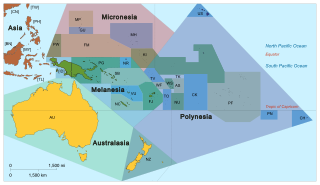Siddiq Moidin Koya (1924–1993) was a Fijian Indian politician, Statesman and Opposition leader. He succeeded to the leadership of the mostly Indo-Fijian National Federation Party (NFP) on the death of the party's founder, A. D. Patel, in October 1969, remaining in this post until 1977. He later served a second term as leader of the NFP, from 1984 to 1987.
Ambalal Dahyabhai Patel, better known as A.D. Patel (1905–1969), was a Fiji Indian politician, farmers' leader and founder and leader of the National Federation Party. Patel was uncompromisingly committed to a vision of an independent Fiji, with full racial integration. He was one of the first to advocate a republic, an ideal not realized in his lifetime. He also advocated a common voters' roll and opposed the communal franchise that characterized Fijian politics.

Communal constituencies were the most durable feature of the Fijian electoral system. In communal constituencies, electors enrolled as ethnic Fijians, Indo-Fijians, Rotuman Islanders, or General electors vote for a candidate of their own respective ethnic groups, in constituencies that have been reserved by ethnicity. Other methods of choosing parliamentarians came and went, but this feature was a constant until their final abolition in the 2013 Constitution.

The National Democratic Party (NDP) was a Fijian political party formed in the early 1960s through a merger of Apisai Tora's Western Democratic Party with Isikeli Nadalo's Fijian National Party. It drew its support mainly from indigenous Fijians in the Province of Ba and other Western regions, who were uneasy about potential domination by powerful chiefs from Eastern Fiji. It subsequently merged with the Federation Party, which was supported almost entirely by Indo-Fijians, to form the National Federation Party (NFP).
Kisan Sangh was the first farmers' union formed in Fiji on 27 November 1937. This was the result of one man's determination to improve the plight of Fiji's Indian cane farmers. Ayodhya Prasad had arrived from India in 1929, and after a stint as a teacher took up cane farming and thus obtained firsthand experience of the problems faced by Fiji Indian cane farmers.
Brahma Dass Lakshman was an Indo-Fijian politician, union leader and businessman, who had a considerable influence on Fiji’s sugar industry.
Tulsi Ram Sharma was the first Indo-Fijian to qualify as a lawyer. He served one term as member of the Legislative Council and three terms as the President of Fiji Indian Football Association. He was one of the founding members of the Maha Sangh, but his association with farmers' union was short-lived. In 1941 he was appointed to Central Indian War Committee, formed by the Government to enlist the support of Indians to the war effort.
The Federation of Cane Growers was formed as an umbrella organisation to negotiate the new cane contract due to take effect from 1960 with the Colonial Sugar Refining Company.

Western United Front (WUF) was an ethnically Fijian political party formed prior to the 1982 elections and contested the election in coalition with the National Federation Party.
James Shankar Singh was a Fiji Indian farmer, businessman, social worker and politician who served as a Minister in the Alliance Government of Ratu Sir Kamisese Mara. Like many Fiji Indian politicians of the era, he joined the Alliance Party with a belief in mutiracialism, but was disappointed with the Alliance Party's appeal to Fijian nationalism after 1977 and left the Alliance to join the National Federation Party.

James Madhavan was one of the longest serving politicians in Fiji. He initially was a primary school teacher but when the Maha Sangh was formed in Labasa was one of its earliest members. Unlike, Viti Levu where it was mainly supported by South Indians, the Maha Sangh in Labasa had support from a wide cross-section of the Fiji Indian community. James Madhavan was able to use this to propel himself into the Legislative Council.
Andrew Indar Narayan Deoki OBE was a Fiji Indian statesman who served his community as a social and religious leader, a soccer administrator, a member of the Legislative Council in colonial Fiji, a member of the Senate in independent Fiji and as the Attorney General.
The Federation Party was Fiji's first formal political party. The Citizens Federation, which had won three of the four seats reserved for Indo-Fijians at the 1963 elections, decided to formalize its role as a political party, which was officially founded on 21 June 1964 with A. D. Patel as President and Sidiq Koya as Vice-President. The merger took place in time for the party to participate in the 1965 constitutional conference which was called to map out a path towards independence from the United Kingdom. In 1968, the Federation Party merged with the National Democratic Party to form the National Federation Party, which is now (2015) the oldest political party in Fiji still in existence.
Karam Chand Ramrakha is a former Fiji Indian lawyer, union leader and politician, who served in colonial Fiji's Legislative Council and independent Fiji's House of Representatives from 1966 to 1982.
The Dove Faction was one of the factions of the National Federation Party (NFP) to contest the September 1977 elections in Fiji.
The number of Fiji Indians that could be elected to the Legislative Council was fixed over the years as follows:
This is a synopsis of organisations formed by Indians in Fiji. When they became free from the bondage of indenture and were able to organise themselves, they founded numerous organizations to seek social and political justice. These organisations promoted the teaching of Indian languages and religious practices and also to helped others in time of need. Some of the successful organisations are listed below in order in which they were established. Some, such as the National Federation Party, are no longer exclusively Indian, but are still predominantly so.








